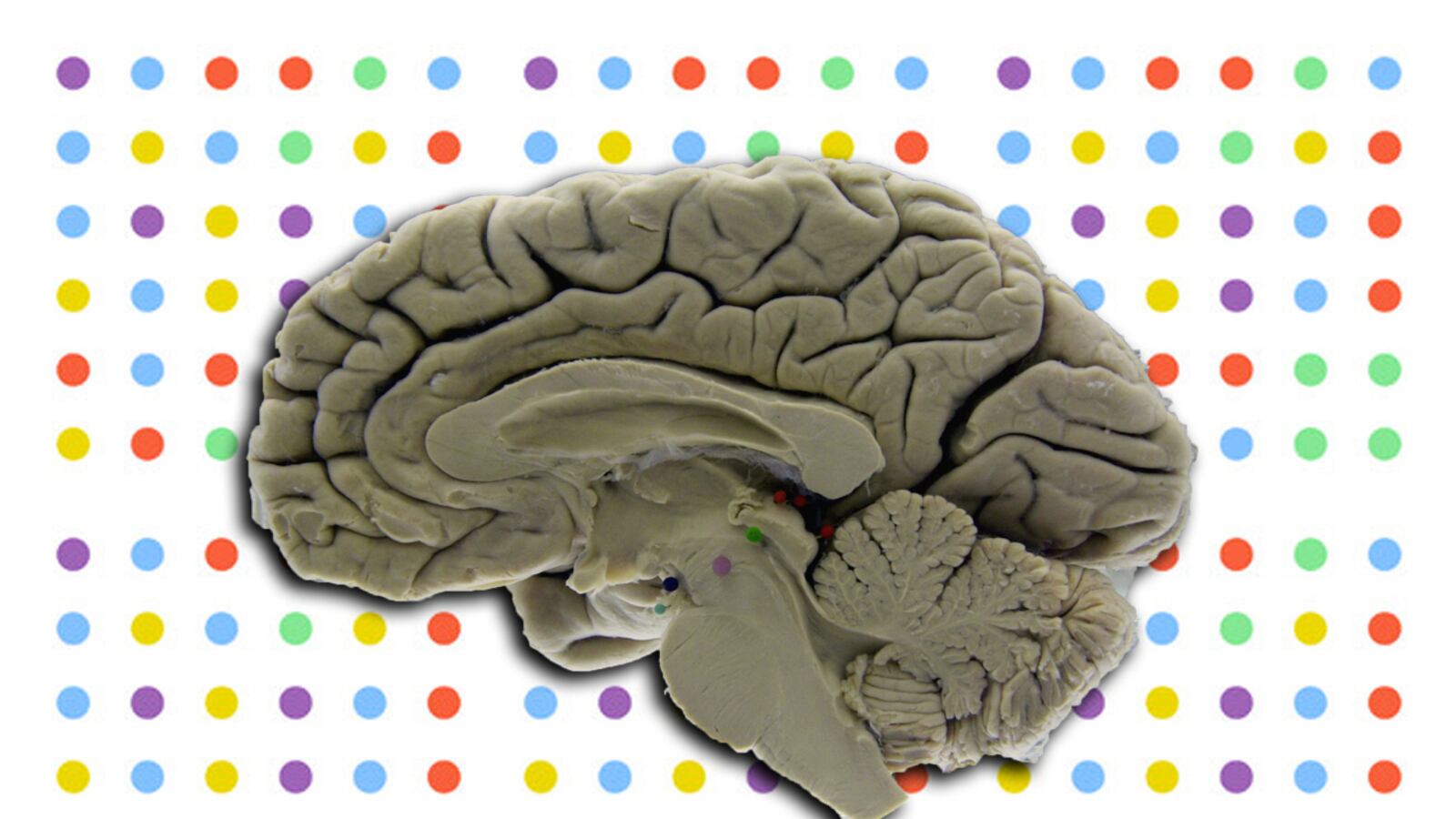Before I begin, a brief note to those of you who may be uninitiated: If you don’t know yet what Dots is (which is unlikely, since the game just hit its three millionth download), please click away to another article. Maybe something on the G8 conference. And for God’s sake, don’t download Dots. Just don't. I won't say anything more. But trust me.

Still with me? The American-made Dots, as you know, is the cleanest, sleekest, most pointless time-killer of a mobile game ever invented, sprinting past last century's wondrous Tetris (developed in Russia), and the totally 2009 Angry Birds (a Finnish product). It even threatens such veteran horizontally integrated favorites as Scrabble, solitaire, and the crossword puzzle. In fact, it may threaten the world as we know it. Simply put: you can't play just one game. Cannot. And in our world of ubiquitous handheld devices, nervous hands, and a blood-curdling fear of an unoccupied moment, Dots is here to stay.
Unfortunately, it probably won't make you any smarter.
You might have wanted to believe otherwise. After all, part of the appeal of Dots is that playing it doesn’t feel like eating junk food. Rather, it takes strategy, sharp eyesight, a quick finger, and a right-now decisiveness to play the game well. As you play, you think, hey, there must be a larger use for these skills I’m honing, right? Some future job, perhaps, where decisions must be made superfast, in mid-air, with a finger dragging across a screen. Surely, the Dots journey is a boot-camp for the real world.
Well, maybe not. More likely, playing Dots fanatically, as about three million of us do, will mainly make you better at…playing Dots.
For proof, please open your Seinfeld textbook to episode 174, that parable called “The Frogger.” Here our anti-hero, George, discovers that the machine storing the video game, Frogger, on which he owns the high score, is set for the junk heap. In response, he buys the machine to assure that "the torch will burn forever”—but must move it to another electrical outlet. As comic fate would have it, to save the machine, he must, Frogger-style, weave it through heavy traffic, something that his previous hours on Frogger have made him confident he can accomplish. As he says, "I've been preparing for this moment my entire life." Of course, George’s plan to frog the Frogger screws up and the machine soon becomes a pile of splinters.
But the Frogger world he refers to—wherein mutant abilities are created by games, puzzles, SAT prep courses, and flash cards and then unleashed with devastating accuracy on their ultimate targets—poses a most basic question: what is knowledge anyhow? Who says knowing how to swipe your finger correctly across the Dots screen will be any more useful in your life than knowing the name of Kim Kardashian’s new baby, or how to spell “knaidel?” Aren't all facts, at the neuron and synapse level, really the same?
Though Dots is too new for research to have been completed, a fair amount of hard-core neurologic research along these lines was conducted in the old Tetris days. Indeed, a search of the medical literature finds more than 30 articles that address issues around Tetris. The studies use MRI scans to assess brain anatomy as well as PET scans, which measure local glucose consumption, to infer how hard the brain works during a Tetris game. Almost every report has found something nice to say—playing Tetris might thicken your gray matter; might decrease the risk of PTSD; Tetris losers had lower levels of testosterone than winners. Plus a few reports have suggested that surgeons who had played videogames such as Top Gun were better at a certain type of surgery than those who were not videophiles.
It should be noted, though, that these sorts of researchers are generally dweebs dying to be viewed as hip, and that this likely leads to a substantial bias to appear younger and more plugged-in, i.e, decidedly pro-Tetris.
In addition to the above work, there is a growing literature around the notion of brain-training old folks using games like Tetris. This simple and overly optimistic approach assumes that the brain is just another organ that could benefit from a structured workout. However, thus far researchers have found only a Frogger effect—people surely improve at the specific game they are practicing, but “the brain training game showed no transfer effect on any global cognitive status nor attention” —in other words, you only got better at the task at hand, not better at thinking in general.
All of these studies seem to point one disheartening direction: try though we may, we can’t find a useful purpose—in the larger cognitive sense—for Dots and its brethren. Yes, the notion that we are sharpening and honing and preparing for something is comforting, but it’s likely only an alibi (and one I use all of the time as I play e-solitaire endlessly—though almost never at weddings, bar mitzvahs, or other solemn events, I promise).
But a guy can hope can’t he? After all, the idea that Dots might have a larger use, a true raison d’être, fits in with the notion we all have that somehow we can train our way into a better tomorrow. And once we work that out, as we age, we might even be able to work a stalemate with the Grim Reaper himself. On the other hand, the classic Bergman movie, The Seventh Seal, has already addressed this one.
It turns out that chess is nothing more than a really complicated game of Dots—and both are games that, despite the pleasant distraction, we never really win.






